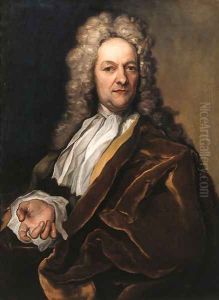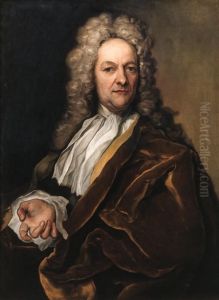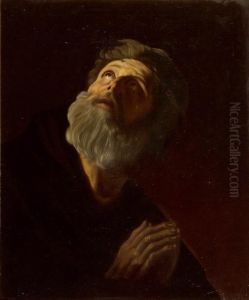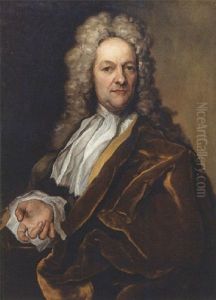Georg Gsell Paintings
Georg Gsell was a Swiss Baroque painter, art consultant, and art dealer who was born on March 28, 1673, in St. Gallen, Switzerland. He is known for his contributions to the arts during the early 18th century, particularly in Russia, where he spent a significant part of his career. Gsell was also the husband of the artist Maria-Dorothea Gsell, née Dietrich, who was a painter in her own right.
Gsell began his artistic training in his hometown before moving to Amsterdam where he furthered his studies. The Netherlands, during this period, was a thriving center for the arts, and it was here that Gsell honed his skills as a painter. His work from this time is not well-documented, and few of his paintings have survived or been attributed to him with certainty.
In 1702, Gsell moved to Russia at the invitation of Tsar Peter the Great, who was implementing a series of reforms to modernize Russia, including the patronage of Western artists and craftsmen to aid in this transformation. Gsell settled in the burgeoning capital of St. Petersburg, where he worked as a court painter. He established a studio and became involved in the organization of the art academy that Peter the Great intended to found, a precursor to the later Imperial Academy of Arts established in 1757.
Georg Gsell's role in Russia extended beyond painting. He served as an art advisor to the Tsar and became a key figure in the development of the Russian art world. He helped to build the Tsar's art collection, providing appraisals and advice on acquisitions. This made him a central figure in the cultural life of St. Petersburg during its formative years.
Throughout his time in Russia, Gsell also worked on various commissions for the royal family and Russian nobility. His works included both portraits and historical paintings. However, many of these works have been lost or remain unidentified. Gsell's influence was not limited to painting; he contributed to the broader visual culture of the Russian court, which included the design and aesthetics of the palatial interiors and the organization of the royal art collections.
Georg Gsell died on November 22, 1740, in St. Petersburg. While not widely known today, his contributions to the early development of the arts in Russia and his role as a mediator between Western European artistic traditions and Russian aspirations cannot be understated. His legacy is partly carried on through the Imperial Academy of Arts, which laid the foundation for Russia's artistic education and the fostering of Russian artists in the generations that followed.



